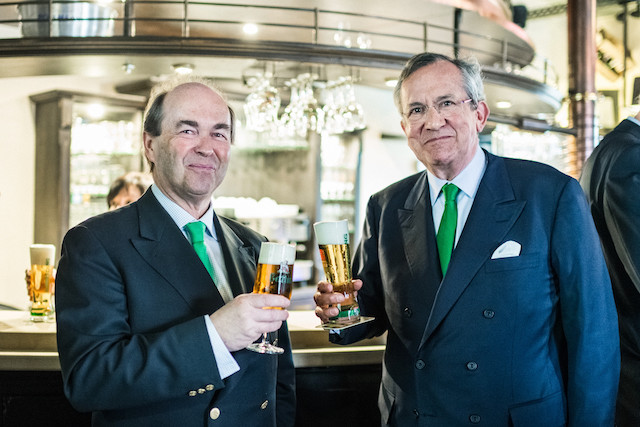Outlining its annual results, the brewery recorded additional sales of 7,250 hl of its selection of beers (Bofferding, Battin, and Funck-Bricher) in 2018, compared with 2017. Turnover rose 4%, to €10.7m while earnings before interest, tax, depreciation and amortisation (Ebitda) jumped 2.5% to €4m.
Brewery CEO Frédéric de Radiguès explained that three new products which entered the market in 2018 also fuelled this growth: Battin Brune, Battin Pils and organic vegan beer Funck-Bricher. As de Radiguès explained, all the beers are vegan but in the case of Funck-Bricher, which was launched on 15 September, it was a question of using a non-animal-based glue to apply the labels.
“We believe the organic market has a potential for 10% of the total market in Luxembourg,” de Radiguès said, adding: “If you take the total Luxembourg market of 300,000 hl, there’s space for 30,000 hl of organic beer.”
The drinks supply subsidiary of the brewery, Munhowen, recorded a €78.2m turnover (+5%) and Ebitda of €6.4m. This was driven by a 8% increase in sales in the Belgian market from 2017 to 2018 while sales in supermarkets in the greater region rose 7% over the same period. De Radiguès explained that the firm had reported an 8% increase in sales outside of Luxembourg in the past 12 years.
Environment
Brasserie Nationale proudly revealed that last year it made reductions in its use of water, electricity and gas equivalent to the consumption of 30 family homes. De Radiguès told Delano after the conference that this represented both a positive for the environment and cost-cutting.
With regards to limiting the environmental impact of its activities in the area of logistics, he told Delano that the firm was looking at what other companies were doing elsewhere. He cited the decision of Swiss retailer Coop to purchase 150 hydrogen-powered lorries.
“The big advantage we have in Luxembourg is that our trucks are not driving so many kilometres,” he said, adding that the firm had not ventured into rolling out electric vehicles for its sales force. “The big challenge in terms of driving with alternative energy is the autonomy you can have. The next question is what is the origin of the electricity.”
The CEO explained he had at one point wished to install photovoltaic panels on the brewery building but costs meant the scheme was abandoned. “The electricity from photovoltaics is three times more expensive than the electricity we buy from Enovos,” he said.
The year ahead
The year ahead may have a few small surprises: a smaller crop of hops as a result of the long hot summer has pushed up prices of this essential ingredient for beer. At the same time, if Britain leaves the European Union without a deal on 29 March, this could put some kinks in the supply chain for bottle caps and organic barley, which is sourced in Scotland. “If there’s really a hurdle at the border, it will be shifted to other sites,” he told Delano.
